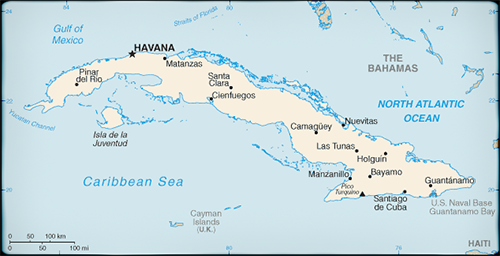The president has announced that the United States is normalizing relations with the island nation of Cuba, our longtime antagonists. Full diplomatic relations means exchange of ambassadors and staff, and a panoply of discussions on any number of issues, including if-and-how sanctions against Cuba will be eased or lifted.
In the immigration context, it raises three questions:

First and foremost, who will be provided visas to come to the United States — how many, and under what conditions. This is a significant question because not granting visas would be a signal that relations aren't, in fact, normalizing. On the other hand, unless and until political and economic conditions substantively change in Cuba, the strong likelihood is that anyone fortunate enough to gain entry to the United States isn't likely to want to return. They will almost certainly seek asylum, and what are the odds they would be denied? So count on a large portion of all the visas granted to result in aliens arriving and residing for the long term — not short family, business, or vacation visits, no matter why the visa was ostensibly issued.
Second, and equally important, what happens to the Cuban Adjustment Act? This Cold War-era law says that any Cuban who is granted parole into the United States may, after one year, apply for adjustment to permanent resident status. In the past, virtually every Cuban who made land in the United States, even if detained for a few days, gained parole and ended up with a green card — no need to even go through the formalities of asking for asylum. No other nation on earth receives such treatment under our immigration laws. Chances are it will not be stricken from the books because the incoming Republican-dominated Congress, already balking at the president's moves toward full diplomatic recognition, would never go down that path. But here's a question: What if the president did what he's already done so many times and just orders an "executive action" not to honor the Cuban Adjustment Act, for instance by refusing to grant paroles and instead, just putting everyone into some kind of made-up "deferred removal" status? This would put many Cuban-American legislators of both parties, who have exhibited no qualms whatever over the constitutionality of his other executive actions to date, into a real pickle, wouldn't it?
Third, will Cuba finally start accepting for return those of its citizens who have broken U.S. immigration laws and been ordered deported — usually because of extraordinarily serious underlying criminal convictions such as drug smuggling, homicide, or other violent offenses? In the last several decades — at least since the Mariel boatlift of 1980, when Fidel Castro emptied his jails and psychiatric institutions onto boats headed to our shores — Cuba has only begrudgingly allowed a few here or there to be repatriated, and only after long and tortuous negotiations. Here, too, we have many reasons to doubt there will be substantive change. Consider, by way of example, Vietnam, a country where we also normalized relations after a long freeze. That nation still declines to accept many, perhaps most, of its citizens who have been ordered deported. In fact, even countries with which we supposedly have warm relations (Jamaica, El Salvador, and Honduras to name just three) drag their feet beyond all imagining in granting the needed travel documents to repatriate deportees from the United States.
Like so many other chapters in the Obama administration's book on immigration, this one is not likely to be pretty.
